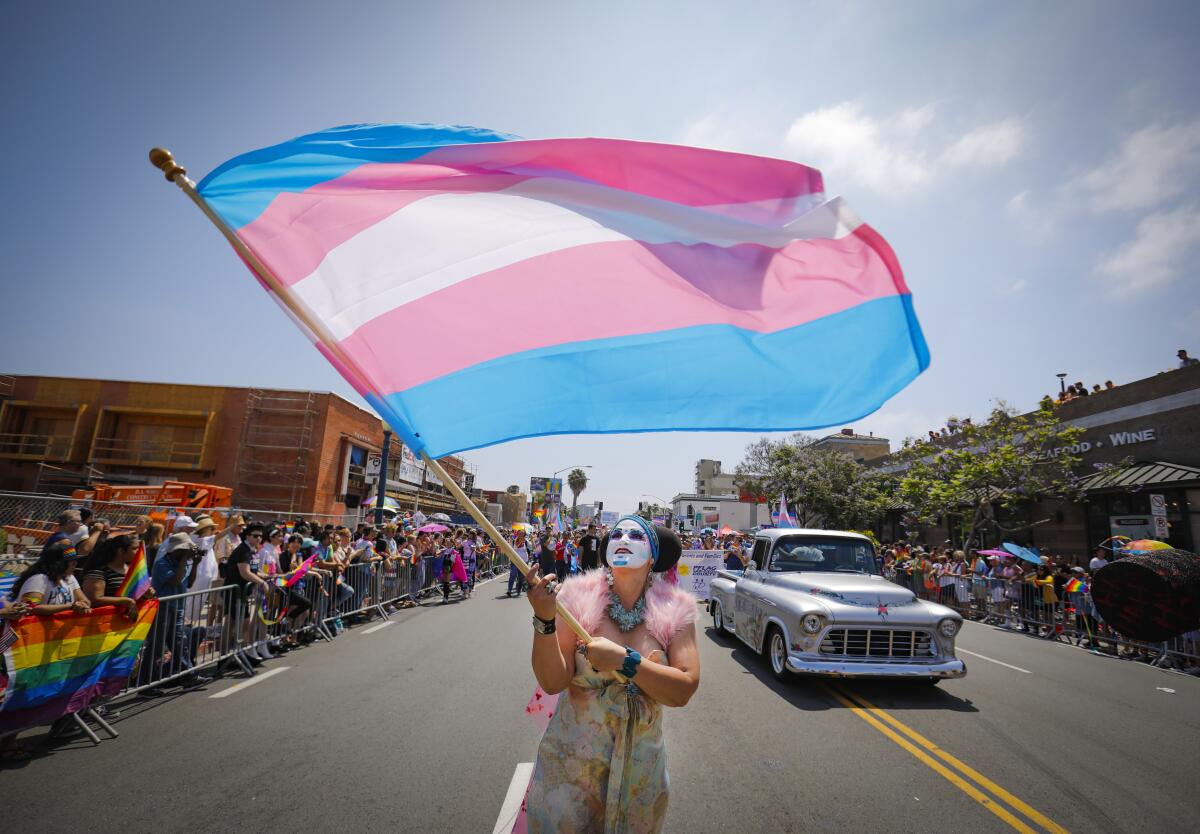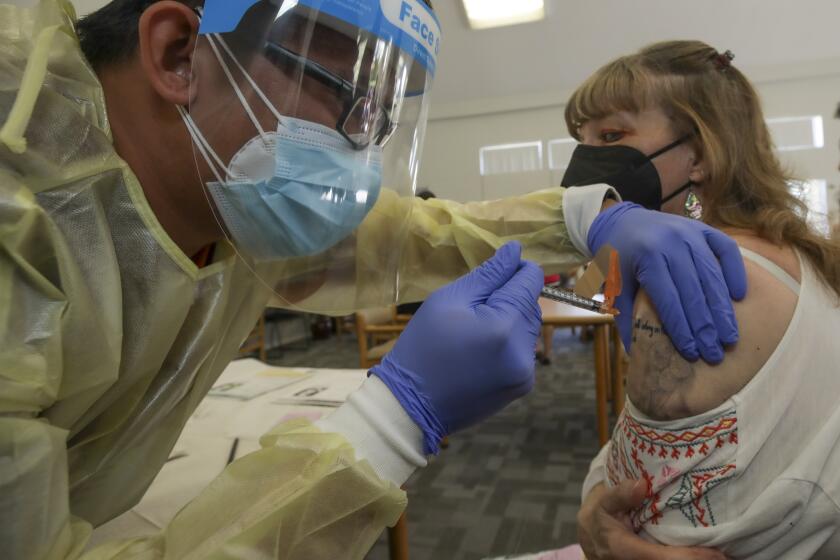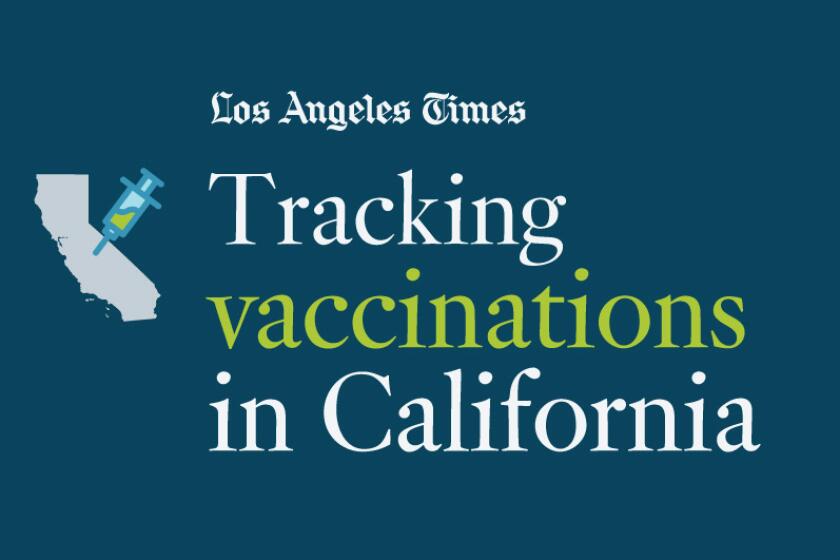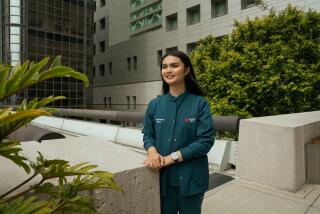Column: California rushed to vaccinate poor people. But what about transgender people?

- Share via
Sitting on the sprawling Mid-City porch of Casa Zulma, an interim housing facility for formerly homeless transgender women, Coral Dawn casually ticked off the many reasons she has no intention of getting vaccinated for COVID-19.
She hates shots. She’s 53 years old and healthy. She doesn’t go out much. She’s skeptical because the coronavirus keeps mutating.
Then came a mirthless laugh.
“The medical community, as a group, has always made things worse for trans girls,” Dawn said, shaking her head. “So, yeah, I certainly don’t have any affection for the medical community.”
This kind of vaccine hesitancy in the transgender community is common, yet, even on International Transgender Day of Visibility, which was on Wednesday this year, it has been invisible.
Although California has worked hard to distribute doses more equitably, some advocates argue there hasn’t been enough outreach to the LGBTQ community.
This level of coverage, though far short of herd immunity, provides some defense against the COVID spikes seen elsewhere in the U.S., officials say.
“There is a fair amount of skepticism, particularly within the trans and gender-nonconforming community, about COVID vaccinations,” said Jury Candelario, director of APAIT, formerly known as the Asian Pacific AIDS Intervention Team. “Some of our clients have just declined.”
How many people we’re talking about is unclear, since there has been very little data collected on the subject at most levels of government.
What data does exist shows that those who identify as lesbian, gay, bisexual, transgender or queer are at higher risk of becoming severely ill from COVID-19, thanks in part to a higher prevalence of underlying health conditions. According to a recent report from the U.S. Centers for Disease Control and Prevention, LGBTQ people report higher rates of heart disease and obesity than straight people. We’re also more likely to be smokers.
What’s more, LGBTQ people of color were twice as likely as white non-LGBTQ people to get COVID-19 during the fall, according to UCLA School of Law’s Williams Institute, and somewhat more likely than non-LGBTQ people of color.
Get the latest from Erika D. Smith
Commentary on people, politics and the quest for a more equitable California.
You may occasionally receive promotional content from the Los Angeles Times.
Meanwhile, California, like most states, has focused most of its vaccine equity efforts on closing income, race and ethnicity gaps, with scant attention paid to sexual orientation or gender identity.
Transgender people, in particular, tend to get missed because they criss-cross multiple demographics, and therefore their particular brand of vaccine hesitancy isn’t getting addressed. This is especially true among Black and Latino trans people, such as Sasha Morehead, who doesn’t want to get vaccinated because she believes “they are just testing it on people.”
“Who wants to hear, ‘Oh, the medicine that you took that was supposed to take away your cold is making you more susceptible to being sterile?’” asked Morehead, who is Black.
To be clear, none of the vaccines — not Moderna, not Pfizer-BioNTech, not Johnson & Johnson — carry such a side effect.
The belief in such conspiracy theories stems from a unique cocktail of mistrust of government, medical research and the healthcare system as a whole that many trans people have developed in reaction to bad experiences.
Some trans people carry the trauma of being misgendered and fear that getting vaccinated will mean having to show some form of identification and explain it. “Not all of our clients,” explained APAIT’s associate director, Jazzmun Crayton, have names that “match their IDs and do not match how they present now.”
Experts say about most Americans will need to be vaccinated to bring the coronavirus pandemic under control. Track California’s progress toward that goal.
Others fear getting vaccinated will interfere with their gender affirming treatment. One client, in particular, Candelario recalled, wants to “make sure that the vaccine doesn’t affect their surgery.”
Still, some have decided to be vaccinated. Back at Casa Zulma, Mariah Darling waved off the risk of side effects, pointing out that even hormone therapy can cause side effects. She decided to get vaccinated after suffering from a particularly rough bout of COVID-19, figuring that the benefits outweigh any risk.
“No matter what you research, there’s good and bad, if you look for something, you can find it on the internet. And I just feel like, for the millions of people that are getting vaccinated every day, it’s generally safe,” she said, as Morehead scoffed. “There’s no way they’re gonna kill off their nurses, doctors. There’s no way they’re gonna kill off all the politicians.”
Kyle Le Grand believes she came down with COVID-19 while she was homeless and living in a car with her partner. She has now been vaccinated, but she fears for other vulnerable trans women who are still living on the streets, especially those who are doing sex work and who don’t have easy access to vaccination sites.
“There needs to be more outreach,” she said. “There needs to be more trust building and there needs to be like something geared specifically for those communities instead of just, ‘Get the vaccine.’”
Candelario agreed.
For weeks, in addition to administering regular coronavirus tests to the trans women living at the two APAIT housing facilities it runs in Los Angeles, he and other staff have chased vaccines, rushing to get clients into vehicles and to vaccination sites when they hear doses are available.
That’s not sustainable — and it’s not the way to achieve the equity that California’s top politicians and public health officials claim they care so much about.
Why not follow the model slowly getting underway for Black and Latino residents of South L.A., and take doses of the vaccine directly to facilities such as Casa Zulma? Why not develop a more robust public messaging campaign that’s targeted directly to the transgender community? And why not collect data to get a better idea of how many trans people are being vaccinated?
“Definitely, there’s a better way,” Candelario said.
More to Read
Get the latest from Erika D. Smith
Commentary on people, politics and the quest for a more equitable California.
You may occasionally receive promotional content from the Los Angeles Times.













